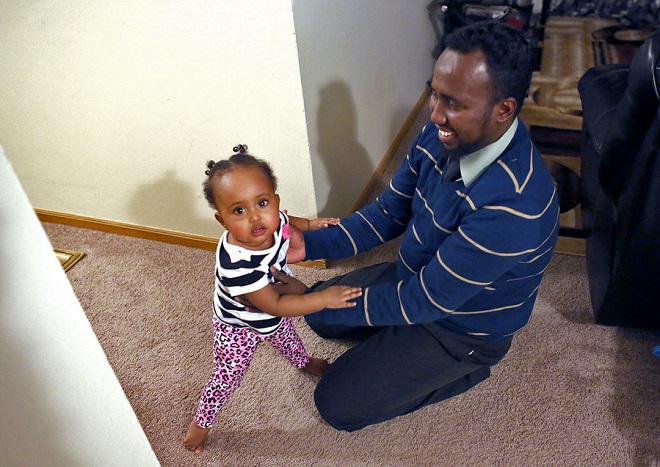
WASHINGTON – Somalis living in the Twin Cities are begging Minnesota’s elected officials to help find a way to safely wire money back to families living in the Horn of Africa after a California bank abruptly ceased wiring cash to the troubled country over the weekend.
The decision by Merchants Bank to stop that part of its operations last Friday caught Somalis, who use money service businesses to wire money abroad, off-guard in communities across the United States.
Of the more than 30,000 Somali immigrants living in the Twin Cities, 80 percent of them use money service businesses to send money abroad, according to the Somali American Money Service Association.
“It’s affecting my life, I need President Obama to know this,” said Abdi Nour Barkad, a 31-year-old St. Paul resident and organizer for the Service Employees International Union. “My brother called me last night. I promised him I would give him money. I told him I don’t know how to give him money. He cried.”
Only a handful of Minnesota banks work with money service businesses to facilitate cash transfers to Somalia. The exact number is unclear because some banks don’t publicize it.
One popular Twin Cities money service business called Dahabshiil has mostly shut down its cash transfers to Somalia because its partner bank was Merchants. Well-known money service businesses, like Western Union, do not operate in that part of the world.
Barkad sends about $400 a month to his parents and siblings in Somalia. His brother was supposed to get married over the weekend — an event Barkad promised he’d help pay for — yet he has no way of getting the money there.
Worries about jihadists
Merchants Bank did not respond to a call for comment, but the move to halt transfers to Somalia comes in the wake of a cease-and-desist order issued last year by the U.S. Treasury Department’s Office of the Comptroller of Currency. According to that order, Merchants could not adequately prove all the money being wired from the U.S. was going to legitimate sources abroad. Treasury officials worry about American-based foreign nationals helping finance jihadist groups, including Somalia-based Al-Shabab, which is among the world’s most dangerous terrorist groups.
“The Somali situation is a terrible human tragedy that cannot be solved by bank regulators,” said Grovetta Gardineer, deputy comptroller for compliance policy and operations at Treasury. “It requires an international government and private sector effort involving organizations that have greater expertise in providing humanitarian assistance and building the infrastructure necessary.”
On Friday, Rep. Keith Ellison and Sens. Amy Klobuchar and Al Franken sent a letter to Secretary of State John Kerry seeking a meeting to craft an “emergency plan” that would address the shortage of reliable money transfer services that Somalis can use to send money to their homeland.
Klobuchar said the group of lawmakers reached out to the State Department rather than Treasury because they felt Kerry would be more sensitive to how a problem this simple could cripple other diplomatic efforts underway in an unstable region.
The letter was also signed by Rep. Erik Paulsen and a number of lawmakers from Wisconsin.
Klobuchar called the issue “more than just an inconvenience,” but a potential diplomatic crisis because the United States is working so aggressively to root out bad elements abroad — including the work to curtail domestic recruitment.
“It’s a part of our work with Somalia. We don’t want to backtrack on that work,” Klobuchar said. “What we don’t want is to shut off legitimately good things coming from our country, which is people helping their family members.”
Ellison, a Democrat, called what was happening to the tens of thousands of Somalis — many of whom reside in his Minneapolis district — a crisis and said the Obama administration has not “justified the excessive force” they are employing.
“I’m waiting for someone to say this money service was used to facilitate terrorist financing,” Ellison said. “If it’s happening, then they [the Treasury Department] need to be more transparent about it. … The federal government is running a legitimate business out of business with excessive regulation.”
Ellison also worries that without legal, viable options, Somalis will be forced further underground to funnel their money out of the United States. That option, he said, is more risky for everyone involved.
Somalia’s economy is hugely dependent on money sent into the country from people abroad. The humanitarian organization Oxfam found that between 25 and 45 percent of the country’s gross domestic product comes from the $1.3 billion in money coming from people living abroad. The U.S. contributes about $200 million a year.
Abdulaziz Sugule is the president of the Somali American Money Service Association and every month sends money to family members in his home country.
“Unless something happens, this is very bad,” Sugule said. “I send money every month for my family, otherwise they can’t go to school, they can’t feed themselves, the whole community is going to suffer because of this.
![]() , Allison Sherry
, Allison Sherry






























